A ruling from the Arizona Court of Appeals on Tuesday will allow students to sue Arizona’s three state universities for what they believe to be unconstitutional tuition surcharges.
The ruling came as a result of a lengthy court case that began in 2003 by four individuals who were UA students at the time.
John Kromko, one of the original plaintiffs and UA alumnus, said the group decided to sue in response to a 39.1 percent tuition increase in March 2003 that they deemed unconstitutional.
“”Tuition has gotten completely out of hand,”” Kromko said. “”Students are going along with increases now without even questioning the motives of the university.””
The students and their lawyer, Paul Gattone, argued that tuition surcharges violated Article 11, Section 6 of the Arizona Constitution, which mandates that “”the university and all other state educational institutions be as nearly free as possible,”” according to case documents from the Arizona Court of Appeals.
Arizona is one of the only states in the nation that has a clause such as this written into its constitution, a provision of this case which makes it unique, said Andrew Silverman, a UA professor of law.
“”I don’t know of any other state which has a provision that says anything about tuition in their constitution,”” Silverman said.
For students, the decision comes as a civics lesson reminding them that all persons have a legal voice in this country, said Cari Gerchick, director of communication for the Arizona Supreme Court.
“”I hope this teaches students that the court is open to everyone,”” Gerchick said. “”It doesn’t matter if a person in a case is 6 years old, as long as they have standing.””
The students were attending the UA at the time the case was brought forth, so they had standing because they were directly affected by tuition increases, Gerchick said.
Anne Barton, spokeswoman for the Arizona Board of Regents, said the regents have not yet had a chance to consider the ruling of the case in the Court of Appeals.
“”We will try to review the case with the attorney general to find options,”” Barton said.
One of those options could be to take the case to the Arizona Supreme Court, she added.
“”The court’s decision was not based on the merits of the decisions of the regents, but on whether or not the board’s decision is subject to review,”” she said.
Regent Dennis DeConcini said that although he has not had time to digest the court’s findings, he has no problem with students suing over what they feel to be excess tuition charges.
Arizona Attorney General Terry Goddard declined to comment.
More than likely, the case will be up for review by the Arizona Supreme Court. If a review is granted, the court will either sustain or overrule the current ruling, Gerchick said.
The case also has the potential to turn into a class-action lawsuit, in which Gattone would argue on the behalf of every student enrolled in the university school systems, Gerchick said.
In a 2001 Arizona Supreme Court class-action lawsuit known as “”Ladewig,”” the Court found the state’s assessment of property taxes to be unconstitutional, a ruling that required the Legislature to then reimburse affected citizens.
Citing this case as an example, Gerchick said if the class-action lawsuit holds, the state Legislature could owe every student the excess money they paid for tuition surcharges.
But the case is a long way from reaching a point at which money could be given back to students, Silverman said.
But Kromoko said tuition has gotten out of hand.
“”The university has built more buildings than they can afford, and students are paying for it,”” Kromko said.
President Robert Shelton had no comment, said Linda Stapleton, executive assistant to Shelton, as the decision pertains mostly to the Arizona Board of Regents and the state Legislature.
Kromko said he thinks his case has a chance of winning based on the writing of the court.
However, because every original plaintiff has since graduated, the case needs to recruit currently enrolled students who are upset with tuition increases.
“”I am disappointed that students haven’t objected more to tuition increases,”” he added.
Kromko said students interested in becoming involved in the case should contact him via e-mail at kromko@dakotacom.net.









